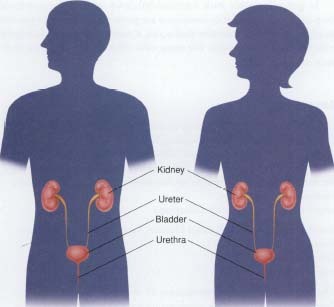Incontinence
Incontinence is a person's inability to control when he or she passes urine orfeces.
KEYWORDS
for searching the Internet and other reference sources
Defecation
Urination
What Is Incontinence?
Older men and women, as well as some young children, find they cannot wait when they have to go to the bathroom. Usually, incontinence (in-KON-ti-nens) involves urinating at the wrong time, or it can mean having a bowel movement before reaching a bathroom. Although incontinence

Sometimes it is simply a small amount of urine that is released when a person strains, such as with coughing or laughing too hard. For others, it occurs only when the bladder is too full.
What Causes Incontinence?
There are many causes for incontinence. Urinary tract infections, cancer, diabetes, stroke, Parkinson's disease, and Alzheimer's disease are some of the illnesses that can cause incontinence. Several problems in the brain or spinal cord can lead to urine and bowel incontinence. Surprisingly, severe constipation can cause bowel incontinence. Withholding stool can cause a hardened plug of stool to block the rectum. This plug irritates the lining of the rectum and causes watery stool to leak out from around the hardened plug.
Urinary incontinence affects more older women than men. One reason is that changes in a woman's hormone levels later in life can weaken muscles that control urination. Woman who have had children also may experience more incontinence because the muscles that are stretched during pregnancy and childbirth may become weakened.
Some over-the-counter cold medicines as well as some prescription drugs for conditions such as high-blood pressure can cause incontinence.
How Is Incontinence Treated?
Treatments for urinary incontinence involve avoiding liquids and caf-feinated drinks such as coffee near bedtime and going to the bathroom at regular intervals. Also, a woman can do certain exercises to strengthen weakened muscles and help her control her urine. Some adults wear pads to absorb small amounts of urine that leak. Medications and surgery are helpful for some people.
The treatment for bowel incontinence depends on the cause. If the cause is chronic constipation, treatment involves adding fiber to the diet and correcting the constipation. Other causes may require surgery.
See also
Bedwetting
Comment about this article, ask questions, or add new information about this topic: